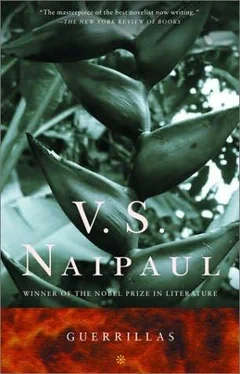V. Naipaul - Guerrillas
Здесь есть возможность читать онлайн «V. Naipaul - Guerrillas» весь текст электронной книги совершенно бесплатно (целиком полную версию без сокращений). В некоторых случаях можно слушать аудио, скачать через торрент в формате fb2 и присутствует краткое содержание. Год выпуска: 1990, ISBN: 1990, Издательство: Vintage, Жанр: Современная проза, на английском языке. Описание произведения, (предисловие) а так же отзывы посетителей доступны на портале библиотеки ЛибКат.
- Название:Guerrillas
- Автор:
- Издательство:Vintage
- Жанр:
- Год:1990
- ISBN:978-0679731740
- Рейтинг книги:5 / 5. Голосов: 1
-
Избранное:Добавить в избранное
- Отзывы:
-
Ваша оценка:
- 100
- 1
- 2
- 3
- 4
- 5
Guerrillas: краткое содержание, описание и аннотация
Предлагаем к чтению аннотацию, описание, краткое содержание или предисловие (зависит от того, что написал сам автор книги «Guerrillas»). Если вы не нашли необходимую информацию о книге — напишите в комментариях, мы постараемся отыскать её.
Guerrillas — читать онлайн бесплатно полную книгу (весь текст) целиком
Ниже представлен текст книги, разбитый по страницам. Система сохранения места последней прочитанной страницы, позволяет с удобством читать онлайн бесплатно книгу «Guerrillas», без необходимости каждый раз заново искать на чём Вы остановились. Поставьте закладку, и сможете в любой момент перейти на страницу, на которой закончили чтение.
Интервал:
Закладка:
“He’s jealous of that woman in Wimbledon,” Jane said. “I suppose he wants us to look in his eyes too and understand the meaning of hate.”
Roche said, with his laugh, “He doesn’t have to try. I was trying to work out that last game he made us play. It works, doesn’t it? I suppose the proposition is really very simple. I suppose it’s just a demonstration of the fact that we are what we are, and can’t imagine ourselves being anybody else. I don’t suppose it’s more than that.”
Harry said, “ ‘The life you will lead is the life you have led.’ That’s a damn depressing thing to tell people on a Sunday morning.”
Roche said, “It depends on how you look at it. It can be comforting as well.”
“ ‘Nobody will make a new life,’ ” Harry said. “No, man. He’s got me wrong.”
It was nearly the end of this Sunday at the beach house. They were heavy with rum punch and food, fatigued by the light. They fell silent. It was the time when Marie-Thérèse, in her long dress, would go round and whisper to her guests, proposing rest, or a game of draughts or chess, or a walk to the estuary, or a drive into the bush. Her soft presence then would keep the holiday alive. Without her the house went dead. Outside was white light, the repetitive beat of the sea on the steep and narrow shore rim, the faint ring of a bell, faint chatter borne on the wind. Open to wind and light, the house on the cliff felt empty and abandoned.
11
FOR A WHILE the road stayed close to the coast: the dazzle of the afternoon sea; rocky coves now half in shadow; little bays where no one bathed, where jagged rocks pushed out of smooth gray sand; white, sunlit spray on black-brown reefs. Then the sea noise was left behind, and they were in the high woods, where three or four kinds of a wild, spiny palm grew among tall white-trunked trees hung with creepers with giant shining heart-shaped leaves. The road was like a green tunnel. But the woods which looked so thick and old had been destroyed in many places. Patches of scorched openness, where secondary bush looked collapsed and brown, showed the drought; and the light there was hard and still. Sometimes, for stretches, the woods were only a screen beside the road, and the hard light and the openness behind showed through.
Jane was tired and strained. She was pale, and her eyes, as always at times of stress, were moist.
She said, “Do you think Marie-Thérèse will go back?”
Roche said, “I used to think so until today. Now I’m not so sure. Seeing Harry today makes you understand what she’s had to put up with.”
“Harry’s cosy little world is breaking up.” She spoke absently. “ ‘Man, you come to de beach house dis Sunday, man.’ ”
Roche said, “It looked cosy to us. I wonder whether it was ever cosy.”
Jane said, “Well.” And a little later she added, “Everything has its season.”
He recognized the sentence as one of his own. He said, “I suppose we must seem pretty cosy to them too. We’re just visitors.”
“I’m damn glad I’m a visitor.”
The high woods gradually gave way to secondary bush: overgrown old cocoa estates and coffee estates, with tall shade trees that here and there gave an impression of forest. They passed derelict old cocoa drying houses, with once movable roofs that ran on rails, some roofs now forever open. Occasionally, in dirt yards beside the road, there were little rotting shacks, hollow and flimsy-looking with doors and windows open, tin roofs eaten up with rust, old unpainted wood the color of ashes; and sometimes there were little shack villages, with a collapsing shop on stilts, tin advertisements bright on its open doors, a glass case of soft bread and cakes on the counter, and on the shelves, as gray and mottled as the outer walls, jars of cheap sweets and upright bottles of sweet carbonated drinks. Sometimes there was a small timber church or church hall. Sometimes a signboard, as bright as a shop sign, on what looked like a private house, announced a hall of a private sect. And on the road were groups walking to worship, dressed up in the heat of the afternoon, the men in dark suits and brown shoes, the women in flimsy pink or yellow dresses showing the satin chemise below, the shadows of the walkers falling black on the black asphalt road that wound through the hilly land.
Children played in some yards. Sometimes, on a veranda, a bare-backed man, face and hands blacker than his chest, as though scorched by a fire, sat in a hammock made of an old sugar sack and held a naked baby. Father and child: the tedium of Sunday in the bush. This was a busy road. The crowded city was just over two hours away. Yet these villages seemed insulated from the weekend holiday traffic: charmed villages, stranded in time, belonging to another era, an era that contained no possibility of a future.
Jane said, “It’s depressing, isn’t it? It’s so hard for me to remember that when I first came I was dazzled. That morning you drove me from the airport. I was very tired. I couldn’t take anything in. But I thought I was going to get to know it well, and I thought it was very beautiful. That was the best day. Now that I know I’m not going to stay I don’t see it any longer. I wouldn’t care if I never drove along this road again. Meredith was awful, wasn’t he? You see, I was right about him. You told me he was so very urbane.”
“He’s certainly been holding back on a few things.”
“I never thought the word could be applied to someone who looked like that. He was so crestfallen when you said you were leaving.”
Roche smiled.
Jane said, “His little frog’s face absolutely collapsed. He doesn’t like you being here, and he’s hurt when you say you’re going. He just wants you to stay so that he can play his little games with you.”
“He was very hostile. He didn’t make any secret of that.”
“His hostility doesn’t matter.”
Roche smiled: his satyr’s smile. “I don’t suppose it does. Not to you at any rate.”
“He’s the kind of man you have to slap down right from the start. If you don’t want to play there’s nothing he can do about it.”
“It isn’t a game, Jane. You just don’t make a hit and run back to base.”
“All that talk of fuck and cunt. I suppose he expected me to scream and jump on a chair. And I know it’s just that rich woman in Wimbledon he’s riled about.”
“I’d never heard of her before, I must say. I’d only heard about the interview. And I suppose that from a place like this she must look more and more goddesslike. To both of them.”
“Both of them? You mean Jimmy Ahmed?”
Roche didn’t reply.
Jane said, “Do you know who she is?”
He said with sudden irritation, “I don’t know everything. I’ve just told you. I’ve only just heard of her.”
“I was thinking of the photograph in his sitting room. The children without the mother.” Then, after a pause, in a delayed response to his irritation, she said, “I thought you knew something about this place. Something special. Why did you come here? How did you hear about it? What did you think you could do here?”
“I knew as little as you. I knew only what I read in the papers. I thought there would be something for me to do here. Real work, not what I’d been doing before. A regular nine-to-fiver. That was the point I thought Harry was making, and I feel like him. Work is very restful. But if I’d played Meredith’s game beforehand I suppose I would have known differently.”
“ ‘No one makes a new life.’ ”
“It’s a little more complicated than that for me. It isn’t that I just can’t see the future. I’ve got to the stage where I can’t even see what a good future for me would be. If I were being really honest, I suppose I would have told Meredith what you said. That I needed time to think. Harry can dream of Toronto and his skyscraper — I believe that’s how Harry sees it, don’t you? But I no longer have an idea of what I want to do. I’m afraid I’ve stopped thinking of myself as a politician. It’s odd, but I realize that’s what I’ve spent my whole adult life thinking of myself as. And now there’s nothing to replace it. A man just has so many years of optimism. I’d never thought of that, and it isn’t the kind of thing people tell you about.”
Читать дальшеИнтервал:
Закладка:
Похожие книги на «Guerrillas»
Представляем Вашему вниманию похожие книги на «Guerrillas» списком для выбора. Мы отобрали схожую по названию и смыслу литературу в надежде предоставить читателям больше вариантов отыскать новые, интересные, ещё непрочитанные произведения.
Обсуждение, отзывы о книге «Guerrillas» и просто собственные мнения читателей. Оставьте ваши комментарии, напишите, что Вы думаете о произведении, его смысле или главных героях. Укажите что конкретно понравилось, а что нет, и почему Вы так считаете.












